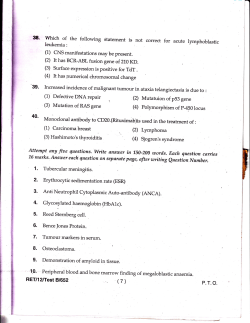
Tumour Marker Requesting Guidance for Non Specialists PSA
Tumour Marker Requesting Guidance for Non Specialists PSA (prostate specific antigen) MEN ONLY Relevant cancer: Prostate cancer Typical clinical presentations that might warrant measurement: Frequency, urgency, nocturia, dysuria, acute retention, back pain, weight loss, anaemia, prostate enlargement. Caution – other benign conditions marker may be raised in: Benign prostatic hyperplasia, urinary tract infection, prostatitis and after catheterisation. Caution – other malignancies marker may be raised in: None known. Notes • Take samples prior to digital rectal examination and >6 weeks after invasive procedures (e.g. prostatectomy) • Objective information for asymptomatic men requesting PSA measurement is available at www.cancerscreening.nhs.uk. CA125 (cancer antigen 125) WOMEN ONLY Relevant cancer: Ovarian cancer Typical clinical presentations that might warrant measurement: Pelvic mass; persistent (more than 12 times / month) and continuous or worsening unexplained abdominal or urinary symptoms, abdominal bloating, increased urinary frequency Caution – other benign conditions marker may be raised in: Pregnancy, menstruation, endometriosis, benign ascites, acute hepatitis, chronic renal failure, heart failure, pleural effusion and others. Caution – other malignancies marker may be raised in: Breast, cervical, endometrial, hepatocellular, lung, pancreatic and other cancers. Notes • NICE recommends CA125 be measured in women with the symptoms above. Women with CA125 >35 kU/L should be referred for pelvic ultrasound. Women with CA125 ≤35 kU/L whose symptoms persist must be reassessed at 6 weeks. CEA (carcinoembryonic antigen) Relevant cancer: Colorectal cancer Typical clinical presentations that might warrant measurement: Follow-up and monitoring of patients with colorectal cancer. Not recommended for diagnosis Caution – other benign conditions marker may be raised in: Irritable bowel syndrome, jaundice, hepatitis, chronic renal failure, pleural inflammation and others. Caution – other malignancies marker may be raised in: Breast, gastric, lung, medullary thyroid carcinoma, mesothelioma, oesophageal, pancreatic and other cancers. Notes • CEA is most appropriately used for monitoring colorectal cancer patients and detecting recurrence. CEA should be measured at 2 to 3 monthly intervals following treatment. • CEA measurement may very occasionally be helpful in frail elderly patients in whom cancer is suspected. pathologyharmony.co.uk working to harmonise standards in UK pathology Tumour Marker Requesting Guidance for Non Specialists AFP & hCG (α-fetoprotein, human chorionic gonadotrophin) Relevant cancer: Testicular / germ cell cancer Typical clinical presentations that might warrant measurement: Diffuse testicular swelling, hardness and pain at any age. Caution – other conditions marker may be raised in: Liver regeneration, hepatitis, benign liver disease (AFP), pregnancy (hCG). Caution – other malignancies marker may be raised in: Hepatocellular, colorectal, gastric, lung and other cancers. Notes • As well as contributing to diagnosis, AFP and hCG measurements are mandatory in the post-treatment monitoring of germ cell tumours following well-defined protocols that depend on stage and treatment. Paraproteins (M-Protein) Relevant cancer: B-cell proliferative disorders (e.g. multiple myeloma, ALamyloidosis, Waldenstrom's macroglobulinaemia and some low grade non-Hodgkin's lymphomas). Typical clinical presentations that might warrant measurement: Unexplained anaemia, bone pain, weakness or fatigue, raised ESR, viscosity or abnormal globulins, hypercalcaemia, renal failure, spontaneous fractures and/or recurrent infections. Caution – other conditions where paraproteins may be present: Conditions, usually autoimmune or infective, in which there is a chronic stimulation of the immunoglobulin response, monoclonal gammopathy of unknown significance (MGUS), and following peripheral blood stem cell transplant (PBSCT), with an increasing prevalence in the elderly. Notes • When requesting paraprotein investigations please send both a serum and a urine specimen. Some laboratories use serum free light chain measurement to help screen for paraproteins but urine investigation may still be required at a later stage. Top tips for optimal requesting • The need for informed consent should be considered. • Opportunistic screening with panels of tumour markers is not helpful. CA125 should not be measured in men nor PSA in women. • Serial results are usually most useful as the main application of serum tumour markers is in monitoring patients with a previously diagnosed malignancy. • Provision of brief and relevant clinical information on the request form is very helpful to the laboratory. • CA 15-3 and CA19-9 should only be requested as and when advised by the specialist secondary care team. This should be indicated on the request form. • Laboratory staff are always pleased to provide advice on test requesting and interpretation. Useful resources For further information please see the following: • General: ’Serum tumour markers: how to order and interpret them’ http://tinyurl.com/TumourMarkers • General: www.labtestsonline.org.uk • PSA: www.cancerscreening.nhs.uk/prostate/ • CA125: http://guidance.nice.org.uk/CG122 • Paraproteins: http://tinyurl.com/Paraproteins • AFP & hCG: www.sign.ac.uk/pdf/sign124.pdf © Pathology Harmony, June 2012 Version 1.0 pathologyharmony.co.uk working to harmonise standards in UK pathology
© Copyright 2025





















